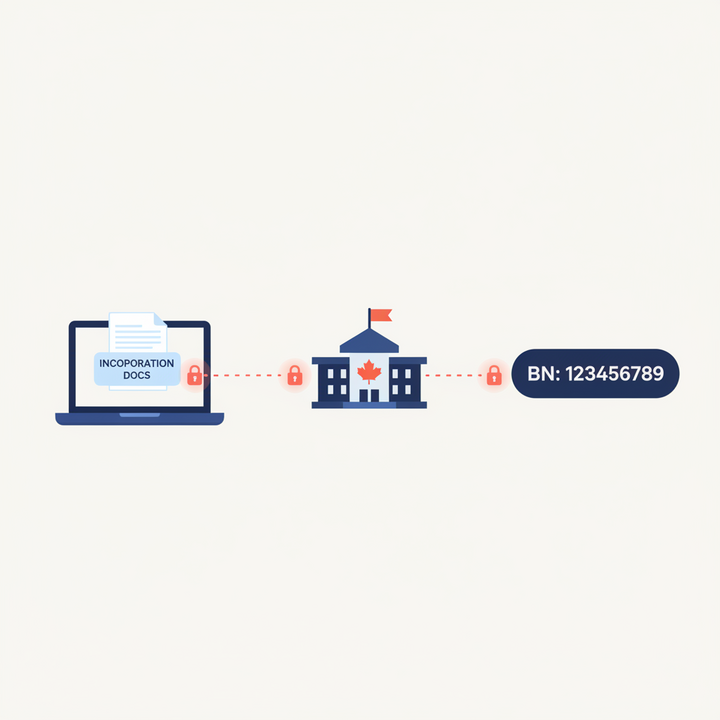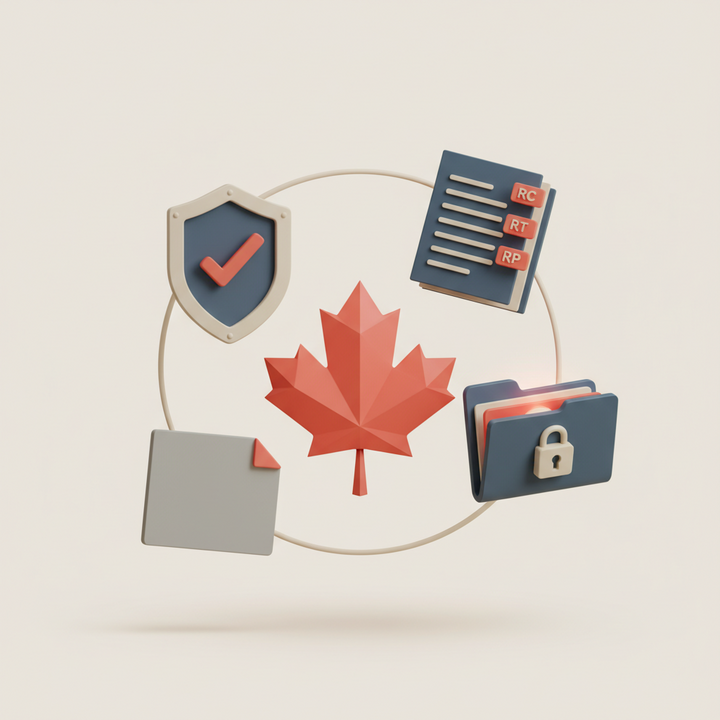Register Your Business Number and Tax Account in Canada
Tax Account in Canada is a crucial part of incorporating a company, and the first essential step is registering your Business Number with the CRA to ensure tax compliance. Navigating through federal incorporation and related tax registrations can be straightforward with the right guidance.
Starting a new venture is exciting, but navigating the administrative side can be a challenge. Setting up your tax account in Canada is one of the most critical steps after your company is formed, as it involves registering with the Canada Revenue Agency (CRA) to ensure compliance and smooth operations.
This involves getting a Business Number (BN) and setting up the correct tax accounts. Getting this right from day one is essential for tax compliance and smooth operations. For a complete overview of the process, our guide on Canada Company Formation is the perfect place to start.
Thinking about forming your company in Canada? We Form Online makes it simple — our team handles everything from name registration to compliance setup.
Choose Your Jurisdiction

What Exactly is a Business Number (BN)?
A Business Number is a unique nine-digit code the CRA assigns to your business. Think of it as your company’s single touchpoint for all federal government interactions. This single number streamlines everything by connecting all your required program accounts, including:
- Corporate income tax (Account suffix: RC)
- GST/HST (Account suffix: RT)
- Payroll deductions (Account suffix: RP)
- Import/export duties (Account suffix: RM)
From my own experience registering BNs for multiple corporations, the online portal is straightforward, but it’s critical to have your incorporation documents ready before you start.
How-To: Register Your BN and Corporate Tax Account in Canada
While We Form Online manages your federal incorporation in Canada, business owners must personally register for a BN directly with the CRA. The process is free and can be completed online.
Here is a step-by-step guide:
- Prepare Your Information: Before visiting the CRA portal, gather your Articles of Incorporation, your business address, and a description of your primary business activities.
- Go to the Business Registration Online (BRO) Portal: The official CRA page is the only place to register. As of 2024, the Canadian government notes that you can often get your business number and some tax accounts as part of the incorporation process itself.
- Complete the Registration Form: You will be asked for your legal business name, incorporation date, and other corporate details. This is where you will also select the specific program accounts you need.
- Submit and Instantly Receive Your BN: Once you submit, your BN is generated immediately on-screen. A common mistake is forgetting to save this number; I always take annotated screenshots for my records because you won’t get a confirmation email or physical mail.
Thinking about forming your company in Canada and setting up your Tax Account in Canada? We Form Online makes it simple — our team handles everything from name registration to compliance setup. Discover Why WeFormOnline is the preferred choice for entrepreneurs.
A Closer Look at Key CRA Program Accounts
Understanding which accounts you need is just as important as getting a BN. Your business activities will determine your specific obligations.
Corporate Income Tax Account (RC)
When you register a corporation in Canada, setting up your Tax Account in Canada is mandatory. It is used to file your annual T2 corporate income tax return and pay any taxes owed. Your Tax Account in Canada is usually created automatically with your BN. Keeping clean financial records is crucial for accurate filing.
GST/HST Account (RT)
You must register for a GST/HST account if your company’s worldwide taxable revenues exceed CAD 30,000 in four consecutive calendar quarters. Many businesses choose to register voluntarily to claim input tax credits on their expenses. Filing frequency (monthly, quarterly, or annually) depends on your revenue.
Payroll Account (RP)
If you plan to hire employees, you must open a payroll account before your first hire’s first day. This account is for remitting deductions for income tax, Canada Pension Plan (CPP) contributions, and Employment Insurance (EI) premiums. The CRA assigns a remitter type that dictates your payment frequency.

Navigating Compliance and Deadlines
Meeting tax deadlines is non-negotiable for keeping your company in good standing.
- BN Registration: Immediately after you incorporate your company.
- Corporate Tax Filing (T2): You have six months after your fiscal year-end to file your return. However, tax payments are typically due within two or three months of your fiscal year-end, depending on the province.
- GST/HST Payments: Deadlines correspond to your filing period.
Staying organized is key. We Form Online provides guidance on these requirements, but remember that the ultimate responsibility for filing and payments lies with you or your accountant. It’s also worth noting that government portal processes can change, so always refer to the latest CRA guidance.
Ready to launch your business in one of the world’s most stable economies? We Form Online offers incorporation services across a variety of top-tier jurisdictions. Explore our full list of All Jurisdictions to find the perfect fit for your global ambitions.
Author: Iliya Talman, WeForm CEO has contacted our Canadian lead content strategist, she is a local CPA with over a decade of experience in corporate accounting and tax strategy. They have personally registered and managed the tax accounts for multiple incorporated companies, bringing first-hand knowledge of the CRA’s processes and potential challenges. Reviewed by: SME, Corporate Law.
Schedule a 15 minutes introduction call with our experts to meet your exact business needs
Schedule a Free Consultation Today